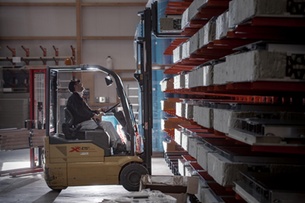Nearly all (99.6%) of all businesses in Switzerland are small and medium-sized enterprises (SMEs) (Keystone) One in four small and medium-sized Swiss firms (SMEs) suffers due to a serious lack of qualified staff, a new Credit Suisse survey reveals. The economic situation in Switzerland is generally favourable to most SMEs, which are slightly more optimistic about the future than they were last year, a Credit Suisse report published on Thursday stated. But difficulties recruiting qualified staff are worrying. Around half of all SMEs have problems finding staff. And some 90,000 Swiss SMEs suffer from an ‘acute lack of skilled staff’, the report said. Companies had difficulties finding candidates with technical or
Topics:
Swissinfo.ch considers the following as important: Business, Featured, newslettersent, Swiss Markets and News
This could be interesting, too:
Nachrichten Ticker - www.finanzen.ch writes Die Performance der Kryptowährungen in KW 9: Das hat sich bei Bitcoin, Ether & Co. getan
Nachrichten Ticker - www.finanzen.ch writes Wer verbirgt sich hinter der Ethereum-Technologie?
Marc Chandler writes March 2025 Monthly
Mark Thornton writes Is Amazon a Union-Busting Leviathan?

Nearly all (99.6%) of all businesses in Switzerland are small and medium-sized enterprises (SMEs) (Keystone)
One in four small and medium-sized Swiss firms (SMEs) suffers due to a serious lack of qualified staff, a new Credit Suisse survey reveals.
The economic situation in Switzerland is generally favourable to most SMEs, which are slightly more optimistic about the future than they were last year, a Credit Suisse report published on Thursday stated. But difficulties recruiting qualified staff are worrying.
Around half of all SMEs have problems finding staff. And some 90,000 Swiss SMEs suffer from an ‘acute lack of skilled staff’, the report said.
Companies had difficulties finding candidates with technical or project management skills, or for general management positions. The worst-affected sectors were in construction and traditional industry, said Sara Carnazzi Weber from Credit Suisse.
Location is crucial
The study, which was carried out among 1,900 SMEs, identified major regional differences. Eastern and central German-speaking cantons, as well as rural, alpine regions have greater staff shortages than others. SMEs in urban areas were much less affected, as were the Lake Geneva and Ticino regions, which benefit from above-average numbers of cross-border workers from France and Italy, Credit Suisse said.
Around 80% of firms said they offered further professional training to existing staff to try to make up for the lack of qualified new recruits, while 53% said they took on apprentices. Searching for qualified staff via professional salons, job sites or recruitment agencies was a less frequently used strategy among SMEs, as was keeping on older workers.
Meanwhile, 62% of firms said they thought the Swiss education system was well adapted to the needs of Swiss firms.
In the coming years, the growing movement towards a digital economy and Switzerland’s aging workforce will complicate the situation of SMEs, and have a significant impact on the job market, Credit Suisse warned. One solution would be to delay the retirement of older employees, but currently only one quarter of SMEs said they resort to this kind of measure.
Although Switzerland has numerous major corporations, such as food giant Nestlé and Asea Brown Boveri (ABB), these firms are not really representative of the country as a manufacturing nation.
In fact, nearly all (99.6%) of all businesses in Switzerland are small and medium-sized enterprises (SMEs). These companies employ 2.27 million people, around two-thirds of all employees. Only about 750 companies have a workforce exceeding 300 people, but they account for 30% of the total workforce.
Many of these firms are engaged in the electrical and mechanical engineering field, the number one manufacturing sector in Switzerland. The majority are extremely specialised and export orientated.
swissinfo.ch/sbTags: Business,Featured,newslettersent
